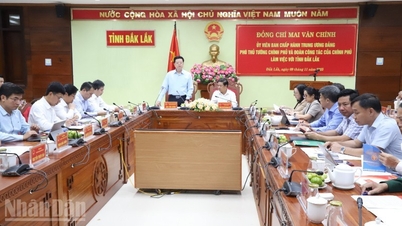National Assembly deputies highly agreed on the necessity of promulgating these three laws, emphasizing that these are draft laws of special importance to the country's development process in the new period, when science , technology, innovation and digital transformation become pillars of sustainable growth, contributing to improving national competitiveness and promoting deep integration.
Perfecting the legal corridor, putting the institution one step ahead
Regarding the Law on Digital Transformation, delegates said that this is a difficult bill, because currently very few countries in the world have a separate law regulating this field. Vietnam's pioneering in building a legal framework for digital transformation is a step in the right direction, demonstrating the strategic vision and high political determination of the Government in the context of digital transformation strongly impacting all areas of economic and social life.
Many opinions assert that the promulgation of the Law is extremely necessary to institutionalize the policy of "putting institutions one step ahead" in the development of science, technology, innovation and digital transformation. Currently, legal regulations related to digital transformation are scattered in many different laws, such as the Law on Electronic Transactions, the Law on Telecommunications, the Law on Network Information Security... leading to a lack of overall coordination mechanism between infrastructure, data, technology and human resources.
When promulgated, the Law on Digital Transformation will contribute to overcoming overlaps, unifying the legal corridor, establishing an inter-sectoral coordination mechanism, thereby promoting the formation of a digital government, digital economy , digital society and digital citizens, creating a foundation for comprehensive digital national development.
At the discussion groups, many delegates expressed high consensus with the viewpoint of building the Law on Digital Transformation in an inclusive and comprehensive direction, ensuring that all organizations and individuals have the opportunity to access, participate in and benefit from the national digital transformation process.
Delegate Le Quang Tung (Can Tho Delegation) said that the digital transformation level between localities is currently different, especially in remote areas. Therefore, the law needs to have a policy to prioritize investment in digital infrastructure for disadvantaged localities, while attracting technology projects to ensure even development and narrow the digital gap between regions.
Sharing the same view, delegate Hoang Duc Thang (Quang Tri delegation) emphasized the consistent principle of "leaving no one behind". According to him, digital transformation must be approached from a humanistic perspective, ensuring that everyone has the opportunity to participate and enjoy the results. The delegate proposed to legislate an inclusive digital transformation policy, from expanding telecommunications infrastructure, building national data centers, to supporting internet access, providing equipment for poor and near-poor households and people in disadvantaged areas.
In addition, online public services must be friendly to people with disabilities, multilingual, suitable for low-configuration devices and weak networks, helping people in all conditions to have equal access, narrowing the digital gap in society.
Support small businesses, agricultural sectors and business households in digital transformation
Delegate Nguyen Minh Tam (Quang Tri Delegation) proposed to add specific mechanisms, resources and incentives for small and medium enterprises, business households and the agricultural sector in the digital transformation process. This force accounts for more than 90% of the total number of enterprises in the country, but digital capacity is still limited, while technology investment costs are high.

National Assembly deputies discuss draft laws in groups.
According to delegate Nguyen Minh Tam, the draft Law has outlined directions to support businesses, but needs to be more specific so that it can be implemented in practice, helping the business community reduce the burden of costs and risks when converting to a digital business model.
Digital transformation is not only a technical issue, but also a matter of institutions, resources and human capacity. Therefore, support policies need to be accompanied by training, consulting and connection programs to help businesses, especially small and medium enterprises, to apply technology effectively, in accordance with the characteristics of the industry and locality.
Delegate Tran Thi Thu Hang (Lam Dong Delegation) said that the draft needs to ensure consistency and consistency with related laws such as the Data Law, the Law on Electronic Transactions (amended)... to avoid overlaps and ensure feasibility when implementing. At the same time, when promulgating, it is necessary to minimize the need to wait for guidance documents so that the Law can soon come into life.
Regarding the State's policy on digital transformation, delegate Tran Thi Thu Hang expressed her high agreement with the draft, while emphasizing the need to prioritize infrastructure development and training of digital transformation human resources for State agencies in remote areas, areas with a large number of ethnic minorities. Without synchronous investment, the implementation will be scattered, costly but not highly effective.
Delegates cited that in the process of implementing the two-tier local government model, many places encountered difficulties in operating the digital system due to lack of human resources and technical conditions. Therefore, there needs to be a specific mechanism to enhance digital transformation capacity at the grassroots level, ensuring effective implementation of national policies on digital transformation.
In addition, delegates also proposed policies to support people in learning and accessing digital technology, helping them have basic skills to use online public services, and participate in the digital environment safely, effectively and sustainably.
The development and promulgation of the Law on Digital Transformation is an important step to perfect institutions, create a unified and synchronous legal corridor, promote comprehensive and inclusive digital transformation in all areas of economic and social life, towards the goal of "leaving no one behind" in the process of developing a digital country, digital economy and digital society in Vietnam.
Source: https://mst.gov.vn/hoan-thien-the-che-chuyen-doi-so-toan-dien-bao-trum-khong-de-ai-bi-bo-lai-phia-sau-197251108231320521.htm
































































































Comment (0)